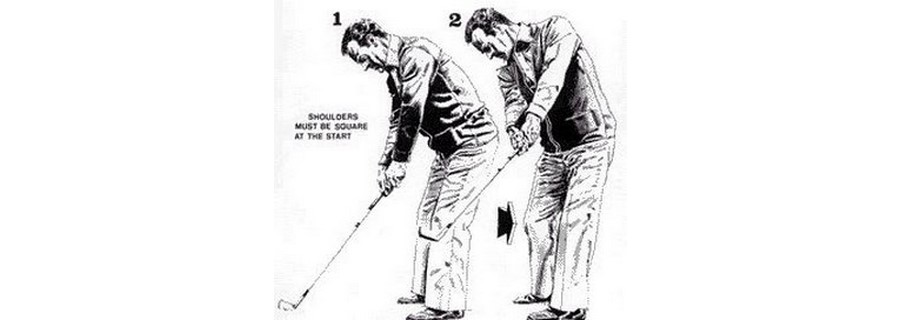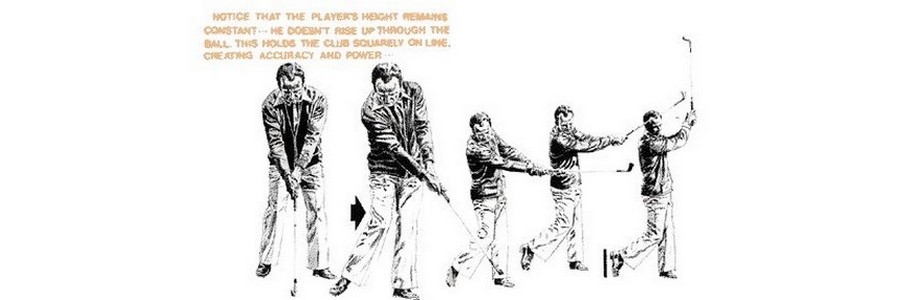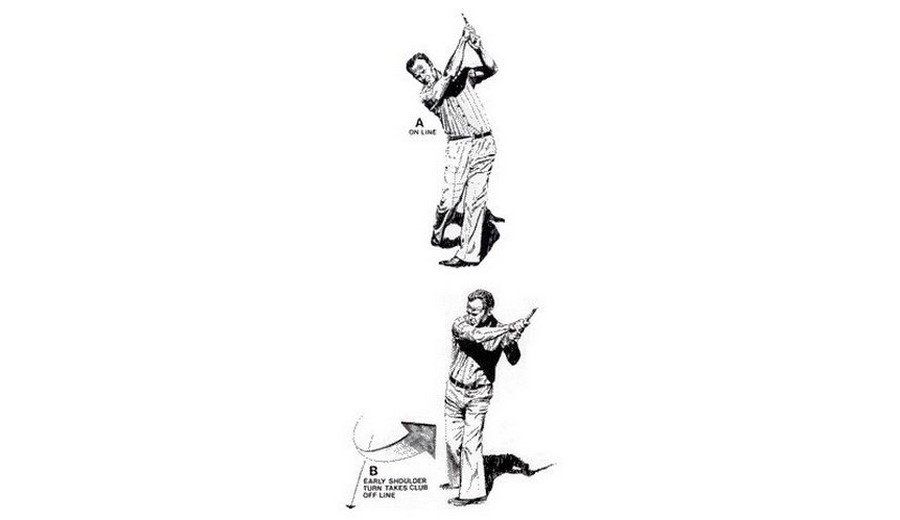We have covered the set-up and address at some length… and quite rightly. These fundamentals are often overlooked by amateur and pro alike, yet they are absolutely vital to good golf. Time taken in checking your grip, set-up and address alignment is never wasted.
Now we are nearing the first phase of the swing movement… the Backswing. But first, lets pause to ask a very fundamental question… WHAT ARE WE TRYING TO DO IN THE GOLF SWING?
It is essential to answer this question CLEARLY and keep that answer in mind all of the time. It is a remarkable fact that few golfers have a really clear idea of what they are trying to achieve with their swings.
The job of the golf swing…
A square impact into and along the intended line of flight
First we are trying to propel the ball straight from point A to point B, from where it lies to a selected target area. This establishes the concept of a line from the ball to the target, the INTENDED LINE OF FLIGHT.
Clearly, if the ball is to move along the intended line of flight, the club-face (or blade) MUST BE MOVING SQUARELY ALONG THE INTENDED LINE OF FLIGHT DURING IMPACT and as long as possible before and after impact.
This holds good for every golf stroke, from the putt to the drive.
With this central idea in mind, we can define the job of the golf swing.
THE GOLF SWING IS A MOVEMENT WHICH CAUSES THE CLUB-HEAD TO SWING INTO AND ALONG THE INTENDED LINE OF FLIGHT THROUGH THE IMPACT AREA AND BEYOND…WITH THE FACE OF THE CLUB SQUARE TO THAT LINE.
This is the guiding principle for everything that we do in building a new swing.
If ever your swing “goes off” it is because these conditions are not being met. Indeed, we can say that a good swing brings about these conditions, and a bad swing does not. It is as simple as that!

The ‘long apex’… a straight, sustained contact with the ball through impact

Thus, we see that it is the section of the swing arc between the feet… the impact zone… that is the key area. It is what happens here that determines the quality of the shot. This area I term THE APEX OF THE SWING.
As I said earlier, the club head must be moving squarely along the intended line of flight BEFORE THE BALL IS STRUCK… and REMAIN on that line well AFTER IMPACT.
The longer the club head remains on the intended line of flight through impact, the better. Or as the Americans put it, we aim to hit the ball FOR A LONG TIME!
This DRIVING FORWARD OF THE BALL is what produces the long accurate shot that can hold its direction in wind. This is the quality of impact that compresses the golf ball on the club-face like a fried egg at the moment of impact. This is the type of impact that leads to powerful, accurate shot-making, and low scores.
I said that the impact zone of the swing was the APEX. Now I want you to think in terms of a LONG SWING APEX. That is a STRAIGHT SUSTAINED CONTACT WITH THE BALL THROUGH IMPACT… ALONG THE INTENDED LINE OF FLIGHT.
That is what the golf swing is all about. That is why we stand square to the intended line of flight. That is why the swing plane must be properly aligned. That is why we must be aware of “CLUB-LINE” or the direction that the club-head is taking through the ball.
Never lose sight of this vital concept of CLUB-LINE THROUGH THE BALL.
It is not enough merely to hit the ball… the club must swing squarely along the intended line of flight through impact and beyond.
Programme for Immediate Improvement
A Vital Exercise – “FRONT END THERAPY”
I am now going to introduce you to an exercise which will prepare you for the new backswing that you will learn in a later lesson.
This exercise, which I call front-end therapy has quickly transformed swings and scores of thousands of players because it establishes an early principle that we must swing freely into and along the intended line of flight with a square blade… driving the ball powerfully forward. This creates both accuracy and power.
You may find it novel that we are dealing with the “front end” (the through swing) of the movement first, before correcting the backswing. However, it is fact that unless your movement through the ball is correct (a square impact into and along the intended line of flight), the best backswing in the world is of no avail at all! After all, the backswing itself is shaped by the intention to swing squarely along the intended line of flight through impact.
So we get the most important part of the movement right first. Then we add it to a correct backswing.
The Most Common Problem In Golf
All poor players, without exception, start the downswing by turning the shoulders first, while the feet remain static. This, of course, throws the club out of line from the top, and any possibility of a correct downswing is instantly ruined
In fact, in a correct downswing, the body should unwind from the feet up. This means that the feet and legs should come into play first with the shoulders unwinding last! In other words, the shoulder line must never run ahead of the hip line in the downswing.
THIS CORRECT DOWNSWING IS ACHIEVED BY PROPER LEG ACTION IN THE SWING, and this exercise shows you how to acquire good foot and leg action…
THIS EXERCISE CAN TRANSFORM YOUR GOLF ALMOST IMMEDIATELY!
EXERCISE PRELIMINARY
First, assume the correct address position and, with a 7 iron in your hands, “free off” the arms by moving them up and down in front of you as described earlier. (Lesson 1) Remember to keep the height constant, do not allow the body to rise up as you swing the club up!
The purpose of this exercise, you will remember, is to get the feeling that the hands and arms can swing freely from the shoulders while the body retains its position.
We are now going to apply this principle to the swing movement.
THE EXERCISE
1. Ground the club as if you were addressing the ball.
2. Move the club-head forward along the intended line of flight, but ensure the right heel immediately comes off the ground, and the right knee begins to fold in towards the left.
NOTE. Do not allow your body to rise up or move in the direction of the hand and arm swing!
3. As the hands and arms swing the club up to about shoulder height (Note the blade is dead square), the right heel is well clear of the ground and the weight has moved to the inside of the right foot. The right knee has moved progressively closer in toward the left knee. The player’s height has NOT increased!
4 & 5. As the hands and arms swing the club up to a finish, the right foot comes up on to the toe.
6. The finish of the stroke. The right knee is now alongside the left. The right foot is now balanced up on the toe, and the foot is vertical. THIS IS MOST IMPORTANT. The player now drops their hands to waist level and checks the blade is still square, as it was at address.


Do this exercise slowly at first, and be sure to bring the right foot and knee into play as soon as the exercise begins. Then, place a ball down, and, taking a short backswing of about two feet, go into the exercise again, this time striking the ball.
CORRECT FOOT AND LEG ACTION ENABLES THE SHOULDERS TO UNWIND LAST. THE CLUB CAN THEN SWING SQUARELY “ON LINE.”

BENEFITS OF THE EXERCISE
By doing this exercise we acquire “swing” and “club-line”.
We establish again that the hands and arms swing the club in the golf movement. The shoulders react to this swing by turning after impact simply and solely to permit the swing to progress freely up to the finish of the stroke. In so doing, the clubhead remains squarely on the line of flight for an extended period of time. This is what good “club-line” through the ball means.
If the shoulders are moving the club, a line through the ball cannot be achieved. The club comes abruptly off line after, and often before, impact, with disastrous results.
Only the hands and arms can swing on line, through the ball. Thus, the shoulders must be square at impact if the club is to meet the ball squarely, and then the shoulders turn to enable the hands and arms to continue to swing freely on the line through impact and beyond. This is what creates accuracy and power.
I say again, if the body rises up or “goes with” the club as it swings through impact, club-line is lost and the swing of the arms and hands is totally destroyed.
This results in a correct finish, as in illustration A. If the shoulders unwind first, the result is the posture in illustration B. Clearly the club-head had not remained on line, and therefore the ball will not fly straight.

B. Early shoulder turn takes club off line
By mastering this exercise your shot making must immediately improve. Correct leg and foot action is enabling your shoulders to unwind last, hence the shoulders are square at impact, creating a square contact with the ball. Then, your shoulders unwind after impact (never, never before) to permit the hands and arms to continue swinging freely from the shoulders, holding the line as they do so.
You are, in fact, swinging the club squarely in the direction that you want the ball to go. Along the line of flight!
Misuse of the shoulders creates a circular arc through the ball which of course, can never result in a straight shot.
So swing freely, and you will hold your “line”.
Unwind with the shoulders and you will destroy that line.
And the key to it all is correct foot and leg action!
Next Lesson – Requirements of a Sound Golf Swing
